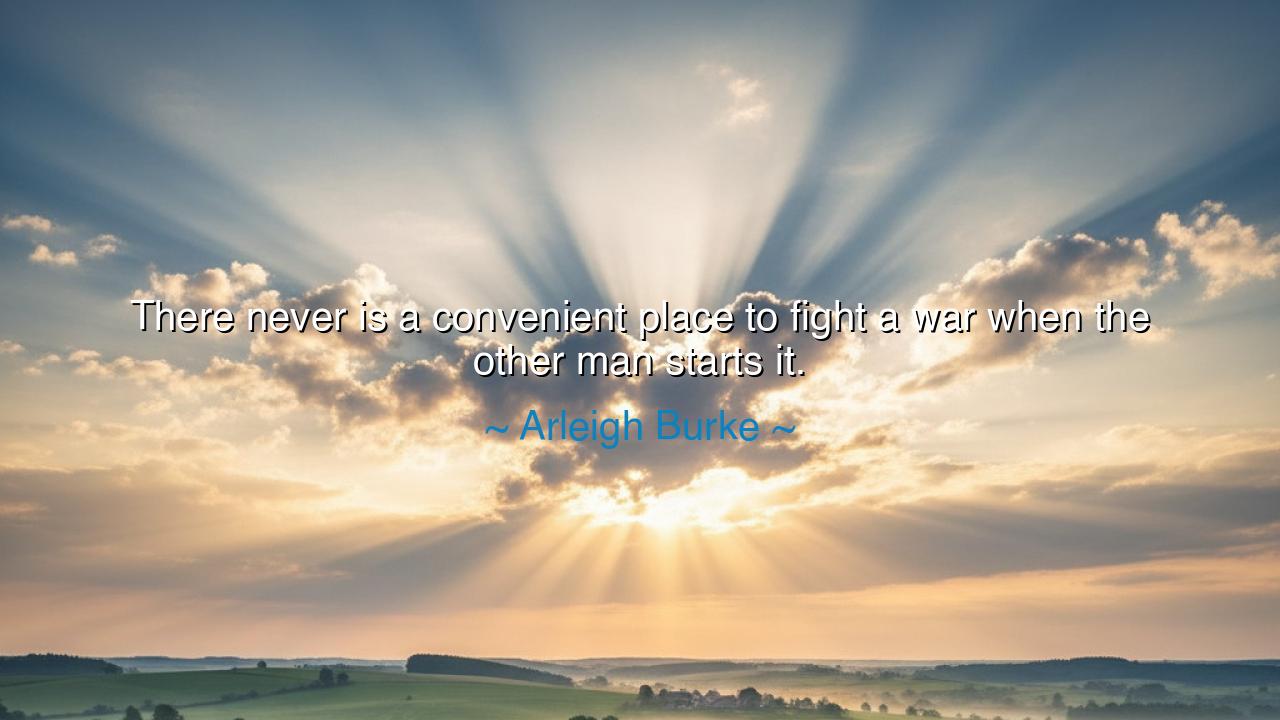
There never is a convenient place to fight a war when the other






Hear the words of Arleigh Burke, a warrior of the seas and admiral of the United States Navy: “There never is a convenient place to fight a war when the other man starts it.” These words, born of storms and battles, carry the eternal truth of conflict: war does not arrive when one is ready, nor does it break upon shores chosen by the defender. It comes like fire in the night, sudden, merciless, demanding courage from those unprepared.
The meaning of this saying lies in its honesty. When an enemy strikes, it is not upon ground of your choosing, nor at the hour of your readiness. It may be on distant seas, in foreign fields, or even at the gates of your own city. To wait for convenience in such moments is to invite defeat. Thus Burke, seasoned by the crucibles of World War II, reminded his sailors that the burden of the defender is always this: to stand and fight, wherever the foe declares battle, with whatever strength can be mustered.
Consider the tale of Pearl Harbor in 1941. The United States did not choose that harbor, that Sunday morning, nor that hour of calm to test its might. The enemy chose it. Bombs fell, ships burned, and thousands perished before America could raise its sword. Yet from that place of sudden calamity rose the spirit of a nation united, proving Burke’s wisdom: that though the place was not convenient, and though the blow was heavy, courage can turn even disaster into the seed of victory.
The origin of Burke’s words rests in his own life as a commander in the Pacific, where battles erupted upon remote islands and vast oceans. Sailors fought not where it was easy to supply, but where the enemy threatened; not where the seas were calm, but where storms and fire raged. The admiral knew that the true measure of a warrior was not comfort, but adaptability, not choosing the field, but mastering it once chosen by fate and foe.
The lesson reaches beyond the battlefield. In the struggles of life, we too do not choose the hour of trial. Illness may strike, betrayal may wound, hardship may descend without warning. These, too, are wars not of our choosing. And yet, like the sailor or soldier, we are called to fight them—not when it is convenient, but when necessity demands. The soul that waits for the perfect moment will perish; the soul that rises in courage, even amid disadvantage, may endure.
Think also of the Battle of Britain. The skies of England were not the ground chosen by its people for struggle. The Luftwaffe came unbidden, raining bombs upon London and villages alike. Yet the people did not yield. Pilots, young and outnumbered, fought daily against overwhelming odds. Churchill called them “the few,” and their defense became the shield of a nation. Here, again, Burke’s truth stands clear: the field was neither convenient nor fair, but it was where the fight came, and so it was where the fight had to be won.
Therefore, let us take this teaching into our lives. Do not wait for the easy place, or the easy time, to face hardship. Do not complain that the enemy strikes unfairly, for enemies do not honor fairness. Instead, cultivate readiness of spirit, adaptability of mind, and courage of heart. When the trial comes—and it surely will—you may not be ready in body, but you must be ready in will.
Thus, O children of tomorrow, remember Admiral Burke’s wisdom. Wars—whether of nations or of life itself—rarely begin where we wish. But victory belongs not to those who lament the ground, but to those who rise and fight upon it. Stand firm, wherever the trial appears, and turn even the most inconvenient battlefield into the stage of your triumph.






TVTrieu Tuong Vy
There’s a cold wisdom in Burke’s words. He’s not glorifying war; he’s acknowledging its unpredictability. You can’t schedule defense like a meeting or plan a battle around convenience. It also makes me wonder if this attitude applies beyond war — that in any crisis, we rarely get to choose the circumstances, only how we respond. Maybe that’s the deeper lesson here.
NAthu tran nguyen anh
This quote reminds me of how easily people romanticize war from a distance. Burke’s tone feels grounded — almost weary. It’s as if he’s saying that once war begins, ideals and strategies are secondary to survival. It makes me think about how civilians often misunderstand the reality of conflict, expecting precision and justice in something that is inherently chaotic.
VANguyen Thi Van Anh
What stands out to me here is the lack of romanticism. Burke strips away the illusion that war is ever strategic or noble. It’s reactionary, messy, and imposed. I wonder if his words were meant as advice to future generations — a reminder that wars are not chosen battlegrounds of glory, but desperate responses to aggression when all other options have failed.
TNThien Nguyen
This statement feels like something only a seasoned military leader could say. It’s both pragmatic and fatalistic — a recognition that war is chaos, and control is mostly an illusion. I find myself asking: does this mindset breed resilience or resignation? Maybe it’s both. Accepting that war is never convenient might be the first step toward confronting it realistically.
HVHong Vi
I read this as a lesson in humility. Burke seems to remind us that war is never on our terms when it’s forced upon us. It makes me wonder how many conflicts could have been avoided if nations focused more on diplomacy than on reacting to aggression. But maybe he’s also saying that complaining about conditions in war misses the point — you fight where you must, not where you wish.